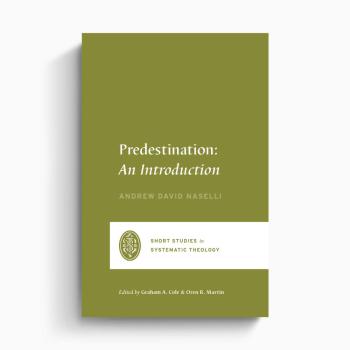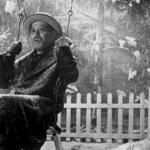Review of Finding God in the Dark: Faith, Disappointment, and the Struggle to Believe by Ted Kluck & Ronnie Martin
By ALEXIS NEAL
Have you ever gone through a difficult time? Had the rug yanked out from under you? Looked disillusionment and disappointment square in the face? If so, you are not alone.
From sports writer Ted Kluck and musician Ronnie Martin comes Finding God in the Dark, which documents their respective struggles toward faith and peace in the midst of pain and hardship. Kluck lived through the heartbreak of a failed adoption; Martin lost his father. Both of them experienced serious setbacks in their respective crafts. Kluck, a writer, lost out on one potential book deal, saw another deal fall through, and received unfavorable reviews for a book that did make it to publication. Martin, the artist behind one-man synth band Joy Electric, was ditched by his label. For both Kluck and Martin, these events dealt serious blows to their egos—and their checkbooks. In Finding God in the Dark, they’ve collected their reflections into a series of alternating chapters from each author, thereby chronicling the process by which they made peace with their circumstances and even grew in faith.
First of all, let me say that the substance of this book is excellent. Kluck’s chapters address the temptation to cynicism and the need to rely on God to help our unbelief (Chapter 1), the blessing of the local church in dealing with hardship (Chapter 3), the importance of genuine repentance for sin (Chapter 5), and the essential foundations of faith in hard times: that God is good, God is sovereign, and God is working in your life (Chapter 7). Martin’s chapters, on the other hand, remind us that God works all things—even hardship—for our good (Chapter 2), that God uses hardship to refine and sanctify us (Chapter 4), that we can rely on God’s character even when we don’t understand His actions (Chapter 6), and that Christ is our only hope in times of trouble (Chapter 8).
At least, I think that’s what they’re about. Both writers favor a sort of stream-of-consciousness approach, fluidly switching from topic to topic within the same chapter, such that it’s hard to get a Big Idea takeaway. Kluck’s thought processes appear to be more linear than Martin’s, but the overall feel is still one of personal reflection more than theological (or practical) instruction. Indeed, both men are extremely open and frank about the sin issues they confronted—so much so that Kluck, at least, sounds at times like, well, kind of a jerk. But then, I don’t know that that’s a bad thing. All Christians are jerks at one time or another, and a book written exclusively for non-jerks would be of extremely limited use. So I applaud the transparency with which Kluck and Martin discuss their sin, even though I was slightly discomfited in reading about it. (Honestly, I think some of the ‘jerk factor’ was a simple result of writing ‘too soon’. Given more time and distance and the benefit of additional reflection and processing, I don’t think Kluck would have included, say, the full text of the rather unpleasant letter he wrote to the adoptive parents who ‘stole’ the kid he and his wife planned to adopt. I also think Kluck would omit the detailed account of the book contract he was denied. I suspect he would focus more on his own pain and disappointment and less on the perceived wrongs committed by others. At the very least, there would have been less heat behind his words. Though I suppose there may be some merit to writing in the midst of the pain—it certainly gives the hurting reader something to relate to.)
Unfortunately, for all the substantive merit of this work, there remain some very real and not-insubstantial flaws. The back-and-forth nature of the alternating chapters was jarring. It may be that Kluck and Martin exchanged chapters during the writing of this book, but if so, the book itself contains precious little evidence of this. They do not respond or refer to one another’s discussions or points. They do not raise points which the other will address in a future chapter. The end result is a book that feels like two separate books (or booklets—the author’s individual contributions would clock in at around 75 pages each) run through a card shuffler. They are united by only two things: both Kluck and Martin experienced hardship leading to a crisis of faith, and both Kluck and Martin have solid theology. Beyond that, they might as well be writing two completely independent works.
Kluck is apparently fond of this back-and-forth method of co-writing; he and Kevin DeYoung used a similar approach in Why We’re Not Emergent: By Two Guys Who Should Be (and it looks like the more recent Why We Love the Church—also co-authored by DeYoung—is similarly structured). However, Why We’re Not Emergent was (slightly) more cohesive, and the subject matter (essentially a list of concerns about the emergent church movement) lent itself more easily to discrete and independent chapters. I suspect that ‘Why’ books are easier to co-author in this manner—you come up with a list of answers/reasons, and then divvy them among the writers and get cracking. Finding God in the Dark is more of a ‘How’ book, and unless your answer consists of discrete steps (which are usually of dubious value anyway, at least when dealing with complex theological or relational matters), using multiple authors presents more of a challenge. Not that it can’t be done, mind you. But it requires clearer presentation and more careful topic selection. The chapters here feel more like ‘stuff I thought about’, ‘more stuff I thought about’, ‘additional realizations’, etc. The ‘bottom line’ of the chapter was surprisingly difficult to discern, and often had little to do with the given chapter title.
Which brings me to my biggest issue with the book: it is in crying need of a good editor. To be fair, I read an advance reading copy, so it may be that the shortcomings I noted will be addressed before the book hits the shelves. But given the pervasiveness of the problems, I rather doubt it. The issue here is not typos and grammatical errors (there may have been some of those; I didn’t really notice). Rather, the writing itself desperately needs to be sharpened.
Kluck is overfond of ‘humorous’ asides, occasionally in footnotes but more often in parentheticals. Some of these are undoubtedly worth keeping, though they should likely be worked into the text itself rather than hamfistedly shoved into a parenthetical; others distract from the points Kluck is trying to make and should be eliminated. They are oddly jokey and don’t fit with the tone of the rest of the book.
Martin’s writing, on the other hand, reads like it was dictated—by which I mean, the gist of what he’s saying comes across, but the sentence structure can be atrocious. It feels like he was making up the sentence as he went along—which is to be expected in casual speech; once you’ve started to make a point you press on and make it as well as you can. You can’t go back and re-say it better, and no one expects you to. But writing can and should be edited, altered, clarified, and improved. A clunky sentence can be tweaked so that it no longer clunks. Paragraphs can be re-worked so that they don’t confuse or distract the reader. Sadly, Martin (and occasionally Kluck) falls victim to the clunky, awkward sentence.
This is a real shame, since, as I noted above, the substance of the book is excellent. But there’s no doubt that a few rounds with a tough-but-fair editor would do wonders for it. I remain hopeful that the final copy will have benefitted from precisely that.
This is by no means the cream of the books-on-suffering crop. But if you can get past the lackluster writing, there is plenty of good, Biblical nourishment to be found.
For more on this book, check out the Patheos Book Club page.
_______________________________________________________________
Alexis Neal is an attorney in the Washington, D.C., area. She regularly reviews young adult literature at www.childrensbooksandreviews.com and everything else at quantum-meruit.blogspot.com.












